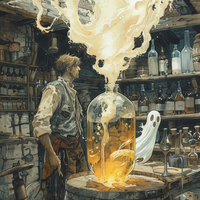Can Dirty Airlocks Spoil My Wine and Beer?
Posted by Matteo Lahm on 13th Nov 2024
Professor Dumbledore taught Harry Potter that dark magic leaves traces. Don't let your previous batch haunt your new one with a dirty airlock. You might take many steps to ensure good results but, even seasoned brewers can fall victim to missing little details, like the size of the footprints on the Marauders Map. How much attention do you devote to your airlocks? You might think, they don’t actually touch the wine and beer so maybe they do not deserve the same degree of care. If you’ve thought this, think again. Either your airlock is as clean as a whistle, or it is a microscopic jungle of bacteria and mold. If it is the latter, you might run into problems and find a dementor lurking in your carboy.
It's crucial to thoroughly clean your airlocks after you use them. If you don't, you might want to consider replacing them before you brew your next batch. They are made of plastic and can harbor bacteria in microscopic crevices and grooves. It's like a five-star hotel for germs, and they're not even paying rent! Seriously, airlocks that have been stored without being cleaned and sanitized belong in the garbage, not on top of your carboy.
Airlocks are tricky little devices with small openings and unreachable chambers designed to protect your beer and wine from outside contaminants. But the design itself can also serve as a contradiction, especially with double chamber airlocks. The same design that makes it so effective in protection can also harbor mold and bacteria, because they are difficult to clean. It's a classic example of Dr. Jekyll and Mr. Hyde.
When airlocks are fitted and especially when there is vigorous fermentation activity, liquid can bubble up inside and back flow into your batch. It's like a party in there, and the bouncer is flirting instead of monitoring the door! Also, the part closer to the beer or wine builds up vapor which can also drip back inside your carboy. If these airlocks have not been properly cleaned and stored, you are allowing bacteria to potentially flow back inside your vessel.
Bacteria like Lactobacillus and Pediococcus, and wild yeasts such as Brettanomyces, are notorious party crashers in the brewing world. These microscopic mischief-makers can sneak into your brew through a dirty airlock and wreak havoc. Lactobacillus, for instance, is a lactic acid bacteria that can give your beer an unwanted sour taste.
Mold is another unwelcome guest that can sneak in through a dirty airlock. These fungal fiends can produce mycotoxins, which not only spoil the taste and aroma of your beer but can also pose health risks. It's like finding out your charming date has a habit of borrowing your toothbrush without asking – it leaves a bad taste in your mouth.
So, what's your best bet? Soak your airlocks in a solution of Easy Clean or One Step after use. If there was overflow and there is noticeable crud inside, let them soak overnight. It's like a spa treatment for your airlocks. If there are larger fruit particles inside, you may even want to add citric acid to your cleaning solution because you want to dissolve any solids as much as possible.
Once they have been cleaned, sanitize them with a sulfite or sanitizing solution. Do not rinse them after this step. Especially with double chamber airlocks, you will not be able to pour out all the water and what is left behind will serve a protective function. Sanitizers leave behind films that will remain on the inner surface and not allow bacteria or mold to grow. It's like a force field against germs!
If you follow these practices, you will only need to do a quick sanitizing rinse before your next use. So, there you have it, folks! Keep your airlocks clean, and your beer and wine will not be appetizing to Lord Voldemort. A clean airlock is a happy airlock, and happy ones don’t make mischief.

